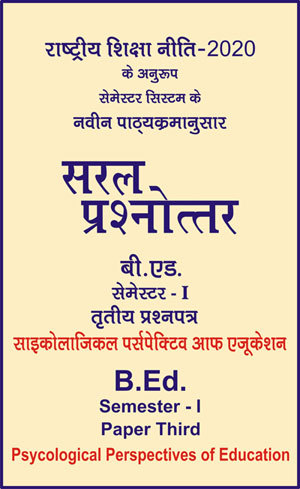|
बी एड - एम एड >> बी.एड. सेमेस्टर-1 प्रश्नपत्र-III - साइकोलाजिकल पर्सपेक्टिव आफ एजूकेशन बी.एड. सेमेस्टर-1 प्रश्नपत्र-III - साइकोलाजिकल पर्सपेक्टिव आफ एजूकेशनसरल प्रश्नोत्तर समूह
|
5 पाठक हैं |
|||||||
बी.एड. सेमेस्टर-1 प्रश्नपत्र-III - साइकोलाजिकल पर्सपेक्टिव आफ एजूकेशन (अंग्रेजी भाषा में)
Chapter 3 - Learning
Question- What is the Learning ?
Answer-
Concept of Learning
Any change in behaviour of an individual brought about by experience is commonly known as Learning. The behaviour is changed through direct or indirect experiences. Learning situations are natural and common in life. Every one learns by his experiences.
What is Learning ?
(1) Skinner : “Learning includes both acquistion and retention.”
(2) Pressy : “Learning represents experience that leads to a change or adjustment in performance and to the acquistion of new ways of behaving.”
(3) Gates : “Learning is modification of behaviour through experience.”
(4) Crow and Crow : “Learning involves the acquistion of habits, knowledge and attitudes.”
(5) J.P. Guilford : “We may define the term very broadly by saying that learning is any change in behaviour, resulting from behaviour.” In this definition, a distinction between change in behaviour, due to maturity and change in behaviour due to learning is unavoidable though both these activities occur simultaneously.
(6) Garrett : “Learning is that activity by virtue of hich we organise our responses with new habits.” Thus, the element of organization in learning is one of the importance of which cannot be over emphasized. Guilford too, has written that the meaning of learning is, inevitably, an organization of behaviour. Thus, in learning to ride a cycle we have to organise the learning of turning the pedal, balancing the handle, etc, in order to be reasonably safe with the vehicle. It is another matter that a person does not learn this organization at the outset and that he may take much longer time to learn to balance the handle than the time he may take to learn to turn the pedal. But his learning of the art of cycling will be completed only when he accomplishes this organization.
(7) R.S. Woodworth : The learning of a new acting is an addition to the persons’ store of experiences. Clarifying the statement further, Woodworth says that reinforcement too, is an indispensable element of the act of learning because this activity forms only successful response and weeds out the unsuccessful responses.
(8) To quote Woodworth : “An activity may be called learning insofar as it develops the individual in any way, good or bad and makes his environment and experiences different from what it would otherwise have been.”
(9) Gardner Murphy : The persons who stress external behaviour consider learning to be a change of behaviour while those who lay emphasis on internal changes, are convinced that learning is change in the perspective of the individual. Combining these two views, Gardner Murphy wrote that, “From this point of view it would be legitimate to regard learning as a modification both of behaviour and of the way of perceiving.”
(10) Hilgard : Many examples may be presented from every day life like, memorising a poem, working at the typewriter, manipulating knife and fork, etc., The following definition of learning given by Hilgard is an essence of all the foregoing definitions offered by other psychologists.
“Learning is the process by which an activity originates or is changed through reacting to an encountered situation, provided that the characteristics of the change in activity cannot be explained on the basis of native ‘response tendencies, maturity or temporary status of the organism.” Despite the fact that this definition is unsatisfactory because of the shortcomings, it may serve its purpose for the time being.
|
|||||














